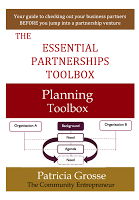Partnership Foundations
MalcolmHolmes | Modules
Five Foundations of Successful Partnerships

1. Commitment
2. Trust
3. Compatible Values
4. Common Philosophy
5. Culture
Commitment Commitment must come from the top. Instigators of operational partnerships may be people working in the business as middle level employees. They have identified a need – to them it all makes common sense. However, this may not fit with the vision of the business. The Board or CEO may not understand the perceived opportunity or urgency, or may wish the business to go it alone, independent of interference from another business. Without commitment at the highest level, the partnership venture will not succeed. What is the expected level of commitment:
Partner A _________________________________________________________________________
Partner B _________________________________________________________________________
Trust Trust is a currency that is difficult to measure, but without it, the value of any partnership venture is zero or negative.
Trust may come with reservations and be fragile, but at least there is a level of trust. When trust breaks down, the situation can become intolerable to the point that it may prove to be impossible to retrieve the situation. It takes just one partner to break the trust. People may have unreal expectations when entering into a partnership venture. Trust may also break down due to misunderstandings. The Framing your Agreement module should help to balance out those expectations and avoid misunderstandings.
Trust is about believing in the reliability of the partners to commit to and work together to achieve the aims and objectives of the partnership. The breakdown of trust may mean that somebody doesn’t believe that any or all of the others will do their bit or that they may believe that there’s a conflict of interest with one of the partners who could be using the partnership to achieve their own agenda. The discovery of hidden agendas is a major contributor to the breakdown of trust.
Partners who don’t have enough knowledge of each other should ensure that they build trust into the Partnership Agreement process.
Compatible Values
Not enough attention is paid to personal and organisational values when putting together a partnership venture, yet this may be a significant factor for partnerships breaking down. Knowing more about each other’s values should assist in developing a good fit.
A business that values employee or client engagement may have difficulties in understanding an organisation that values the financial bottom line. What if your business has a reputation for being entrepreneurial and your partner is risk averse?
You are not required to have the same values, but you should have values that connect at some level.
What are your organisation/business values (for examples – see Values Checklist
☐ ________________________________________________
☐ ________________________________________________
☐ ________________________________________________
☐ ________________________________________________
☐ ________________________________________________
How do they relate to your business partner(s) values?_____________________________________
_________________________________________________________________________________
What are potential issues?
________________________________________________________________________________
________________________________________________________________________________
Common Philosophy
Every organisation has a philosophy. Philosophy acts as the guiding principle for organisational behaviour. It represents the core beliefs, values and principles of the organisation. If one business has the philosophy that everybody is capable of achieving greatness, but another believes that people are widgets, then there’s potential for a clash.
Culture Recognising and understanding organisational culture is an issue as even within the same industry, organisational culture will be different from business to business. All businesses have a culture – the way we do things around here.
Culture can be a blocker when it comes to partnership activities that have the potential to lead to change (or at the extreme, a merger). How do you come up with one set of procedures when each partner has their own way of doing things? An outwardly engaging partner may have a poor workforce ethic operating in the background. They may even been looking for the partnership to address some of their internal conflicts. Culture can be difficult to articulate and the differences may not come to light until well into the partnership venture.
How solid are your partnership foundations? Occasionally review the Collaborative Partnerships Checklist (listed below) to identify the cracks before they become chasms. Up next…. what kind of partnership venture are you involved in? Check out the Levels of Partnership
Downloads
| Collaborative Partnerships | Foundations of Collaborative Partnerships | Values Checklist |

